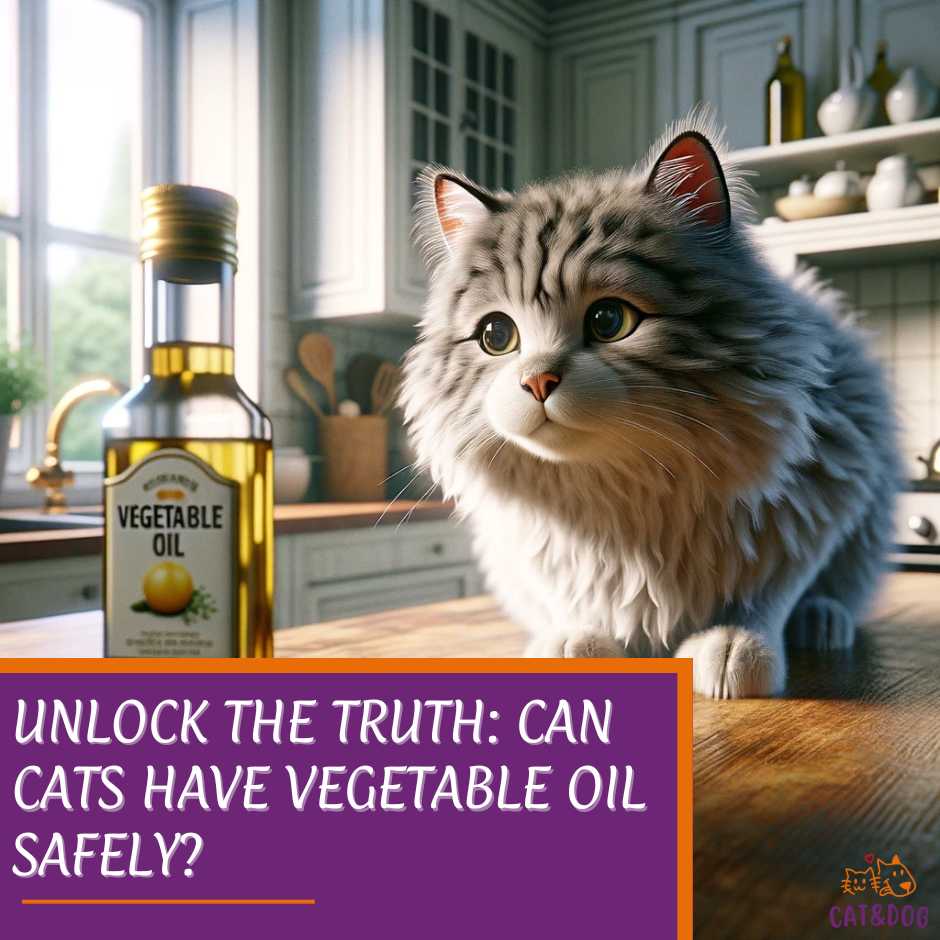As a cat owner, you’re always on the lookout for what’s best for your furry friend’s diet and well-being. After all, a happy cat is the heart of a happy home!
Navigating the minefield of do’s and don’ts in feline nutrition can be tricky, especially with a rise in interest in what our pets eat.
You might be pondering, “Can cats have vegetable oil?” It’s a valid question, given that our meals often contain this ingredient. Let’s dig into the facts and get some vet-approved insights, shall we?
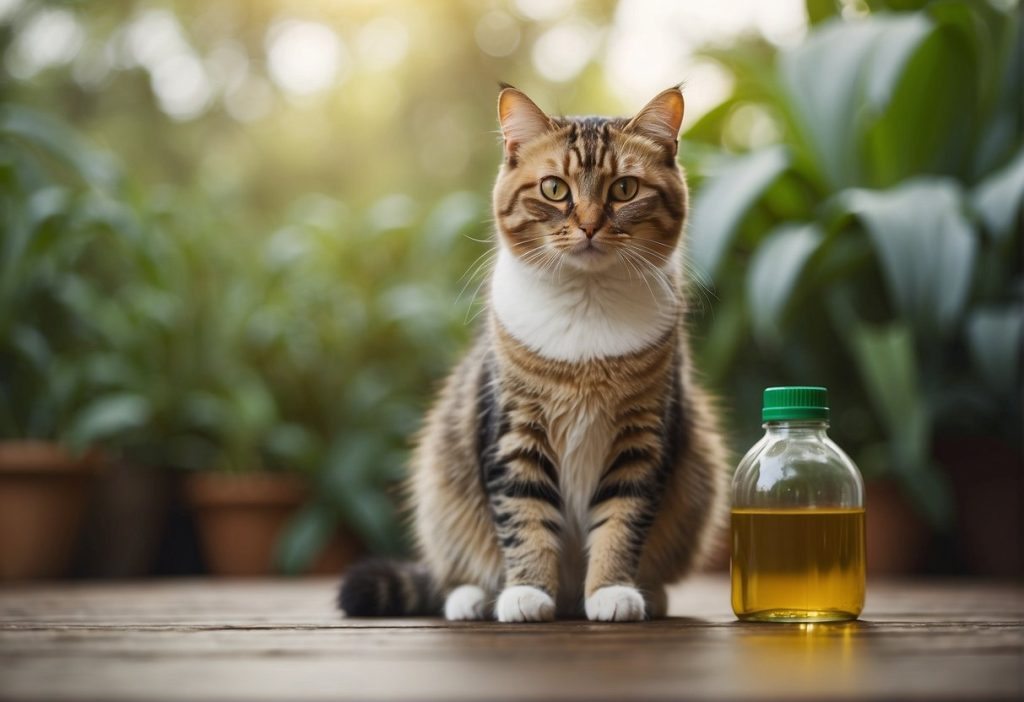
The world seems to be brimming with opinions on what should or should not be in our cats’ food bowls.
With an array of information floating around, it’s crucial to separate the myths from the certified truths about whether vegetable oil has a place in a cat’s diet. Knowing what is safe and healthy for your cat is essential. (1)
So, we’ll explore the safety, potential benefits, and the expert’s standpoint on vegetable oil for cats.
This way, you can make informed decisions and ensure your cat’s meals are not only delicious but also nutritionally balanced.
Key Takeaways
- Vegetable oil is safe for cats in small amounts but unnecessary as a supplement.
- Cats’ dietary needs are best met through high-quality animal proteins. (2)
- Consult with a veterinarian for personalized dietary advice for your cat.
The Safety of Vegetable Oil for Cats
Nutritional Components of Vegetable Oil
Have you ever wondered what’s in the vegetable oil that might end up in your cat’s dish?
Here’s the scoop: vegetable oils are generally rich in unsaturated fats, which include both monounsaturated and polyunsaturated fats. (3)
Cats need fats in their diet for energy and to support cell function, but the balance and type of fat are key.
- Saturated Fats: Typically found in animal products, less common in vegetable oils.
- Monounsaturated Fats: These can aid in maintaining a healthy coat.
- Polyunsaturated Fats: Important for body functions but cats need them in moderation.
Potential Health Benefits
In moderation, certain fats may be beneficial:
- A shiny coat: The monounsaturated fats can give your cat a sleek, glossy look.
- Hairball control: A bit of oil can help keep things moving and may lessen hairball issues.
Risks and Precautions
However, it’s not all smooth purring. Excessive fat intake can lead to trouble:
- Obesity: A high-fat diet might pack on the pounds.
- Pancreatitis: Too much fat is a big no-no and can result in inflammation of the pancreas.
Always remember moderation is key—too much of a good thing can quickly turn into a vet visit. If you’re ever unsure about your cat’s diet, a quick chat with your vet will steer you right.
Individual Variability and Dietary Needs
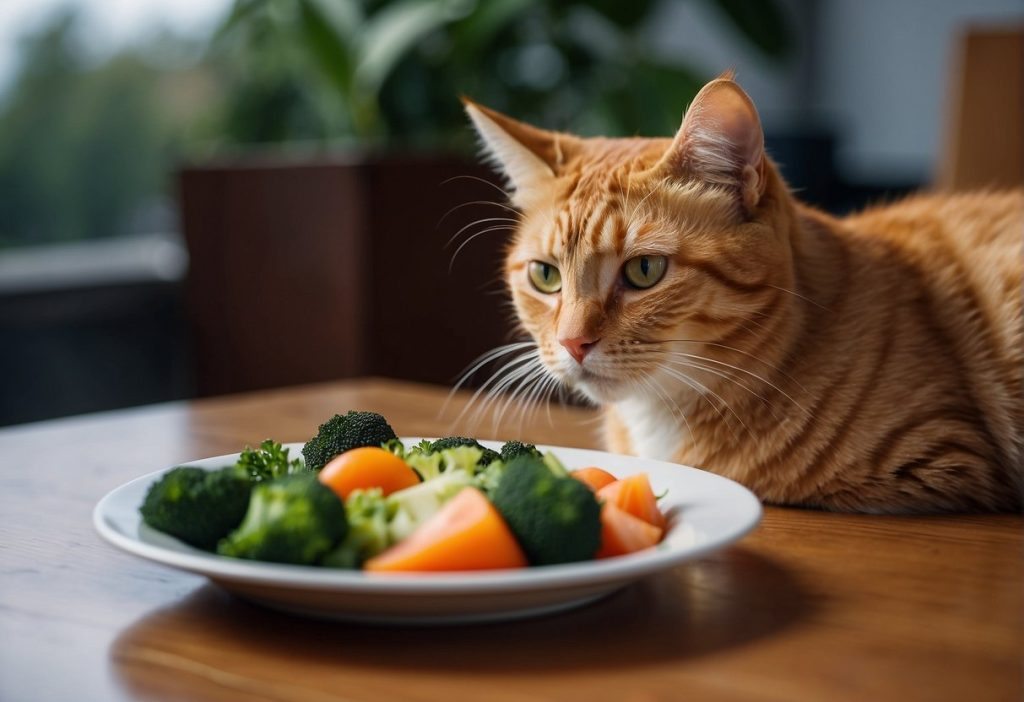
When you’re determining the best diet for your feline friend, it’s vital to consider that not all cats are created equal. Your fur baby is unique, with specific needs that may require a tailored diet.
Have you ever noticed how some breeds have particular quirks? For instance, the gorgeous Persians with their luxurious coats are often prone to hairballs, so they may benefit from a diet rich in fiber.
Let’s consider your cat’s age, breed, and health.
Kittens, for example, require more energy-giving foods to support their growth, whereas senior cats may need diets low in calories but high in easily digestible proteins. (4)
- Breed Specifics:
- Persian cats: Increased fiber for hairball control
- Siamese cats: Moderate fat levels to maintain lean body mass
- Persian cats: Increased fiber for hairball control
Regarding their health, cats with certain conditions might need a different dietary approach.
Take, for instance, a diabetic cat who had a drastic turnaround in health when switched to a high-protein, low-carb diet. Monitoring blood sugar levels became easier, and insulin requirements decreased.
Always remember, if your cat has health issues, a vet consultation before changing their diet is a must.
- Health Specifics:
- Diabetic cats: Low carbohydrates, high protein (5)
- Overweight cats: Calorie-restricted, high-fiber diets
- Diabetic cats: Low carbohydrates, high protein (5)
Here’s a brief tale to chew on: Imagine a diabetic cat named Whiskers. Whiskers was like any other cat but had a love for napping and treats. With diabetes, those treats became a no-go.
Whiskers’s owner, with vet guidance, introduced a special diet that mirrored natural feline eating patterns. Small, nutrient-rich meals throughout the day worked wonders, and Whiskers’s vigor returned!
In all cases, remember to gradually introduce any new food to your cat’s diet to avoid digestive upsets. Your beloved whiskered companion’s well-being is worth the extra effort.
Comparative Analysis with Other Dietary Oils
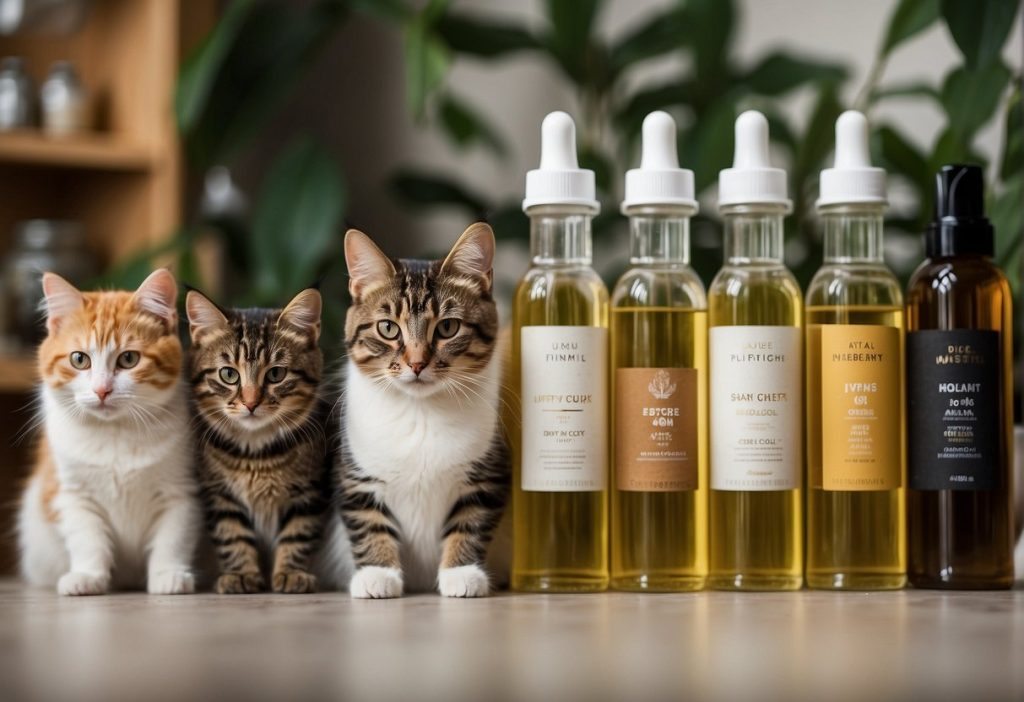
Ever wondered if you’re picking the right oil for your feline friend? Let’s take a peek at how vegetable oil squares up against fish oil and olive oil when it comes to those omega fatty acids that get a lot of buzz.
Vegetable Oil vs. Fish Oil vs. Olive Oil:
- Omega-3 and Omega-6: You’ve probably heard that omega-3 fatty acids are like the superheroes of the fatty acid world, especially for those with fur and whiskers. (6)
Fish oil is the champ here, boasting high levels of omega-3, vital for your cat’s heart and joint health.
Vegetable oil, while it does have some omega-6, doesn’t hold a candle to the omega-3 powerhouse that is fish oil.
Olive oil? It’s a decent contender with a balance of omega-3 and omega-6, but again, it doesn’t topple fish oil.
Before you dash to change your cat’s oil intake, here’s what you need to know:
- Cats can make do with the omega-6 in animal-based fats they typically consume.
- Too much omega-6, like the amount found in many vegetable oils, can lead to inflammation. Not exactly a win for kitty health.
- For specific health needs, your vet might direct you to fish oil for its anti-inflammatory benefits.
So, when you’re swirling around the idea of oils, it’s a pretty safe bet to oil the gears of your cat’s diet with fish oil rather than vegetable oil or olive oil.
Always chat with your vet first, though—they’ve got the scoop on what will work best for your purr-machine’s particular needs.
Remember, the goal is to keep your kitty sleek, not to have them slip-sliding around on a diet that’s not tailored for them. Keep it balanced, and you’ll have one content cat on your hands!
Expert Opinions and Veterinary Insights on Can Cats Have Vegetable Oil
Ever wondered if a drizzle of vegetable oil is a culinary yes or a health no-no for your furry companion? Let’s dip into some vet-approved insights, shall we?
Dr. Johanna Heseltine a reputed veterinarian, advises caution, noting that vegetable oil doesn’t stack up nutritionally for cats like animal-based fats do, so, stay updated with your cat health tips.
It turns out that our feline pals aren’t great at metabolizing those plant-sourced fats. So, while a lick here and there is unlikely to cause chaos, it’s not exactly menu material for cats either.
Yet, not all experts share the same opinion. Some sources hint that there’s a spot for vegetable oil in a cat’s diet, particularly within commercial foods. However, it’s in minuscule amounts and not as a staple.
The consensus? Cats primarily need animal fats—those are the fat sources tailored to their carnivorous cravings and needs.
When I dug into some research, I stumbled upon intriguing studies linking diet and feline well-being.
Case in point: A detailed analysis stressed the importance of fats in a cat’s diet but with the spotlight on fatty acids derived from animal sources for optimal health.
Here’s a pro tip straight from the vet’s mouth:
“A balanced diet is key; supplementing with vegetable oil isn’t necessary and might just grease the wheels for digestive issues.” In other words, check in with your vet before making any oily changes to your cat’s diet.
Remember, each whiskered pal is unique. What works for the cat next door might be a misstep for yours.
Keep an ear to the ground for research and always choose a vet chat over a web search when it comes to your cat’s health.
Alternative Options and Supplements
On the hunt for something healthier to spruce up your kitty’s diet? While common vegetable oil isn’t quite the cat’s meow, you’ve got some other stellar options at your paw-tips!
Other Beneficial Oils for Cats: Let’s talk alternatives to vegetable oil that may be the purr-fect add-on for your furry friend’s nutrition:
- Coconut Oil: A tiny dab of coconut oil can help manage hairballs, and some say it gives your cat’s coat that show-stopping shine!
Just a little though—too much, and you might have a slip and slide in the litter box. - Fish Oil: Packed with omega-3 fatty acids, it’s a big win for skin and joint health.
- Flaxseed Oil: Another great source of omega-3s and it’s plant-based if you’re looking to keep it vegetarian. (7)
Now, let’s peek into the garden of Natural Remedies for Feline Health:
- Milk Thistle: Known for supporting liver health, but always check with your vet before playing cat-chemist.
- Slippery Elm Bark: A gentle herb that can soothe minor digestive issues.
When it comes to your cat’s wellness, always remember that moderation is key and a veterinarian should be your co-pilot on this journey of feline nutrition.
So before you start a supplement regimen, grab some professional advice to ensure your cuddly companion stays healthy, happy, and adventurous—just like a cat should be!
And there you have it, a tidbit of info to chew on or shall I say, for your cat to nibble on! Keep it natural and carry on being the awesome cat parent that you are.
References and Further Reading

Curious about giving your furry friend a drizzle of vegetable oil? Here’s where you can dig deeper into the subject:
Veterinary Journals:
- Journal of Feline Medicine and Surgery – This journal is a treasure trove for cat-related health studies, providing peer-reviewed articles on nutrition and veterinary care.
- Veterinary Record – Find various articles discussing the feline diet and the effects of different food substances on cat health.
Interviews with Nutritionists:
- Pet Nutritionist Insights – Interviews with animal nutritionists often unveil the nuanced benefits and risks of various food items in a cat’s diet, including vegetable oils.
Authoritative Pet Care Websites:
- American Society for the Prevention of Cruelty to Animals (ASPCA) – The ASPCA provides extensive material on what is safe for your cat’s consumption.
- The International Cat Association (TICA) – Their guidelines on feeding and nutrition can help you understand the role of fats in your cat’s diet.
Case Studies and Examples: Keep an eye out for veterinary blogs and websites where they occasionally share case studies of cats with dietary issues like pancreatitis that can be linked to improper oil consumption.
Statistics: You won’t typically find your cat chomping on a bottle of vegetable oil, but moderation is key. Remember, more than 5 mL (0.15 oz) at once may lead to health issues.
Now, does all this talk about oils and fats have you thinking about your diet? We’ve all been there! Just remember, what works for you might not suit your whiskered companion.
Keep it paws-itively clear what’s in their food bowl, and when in doubt, always chat with your vet!
Quick Recap
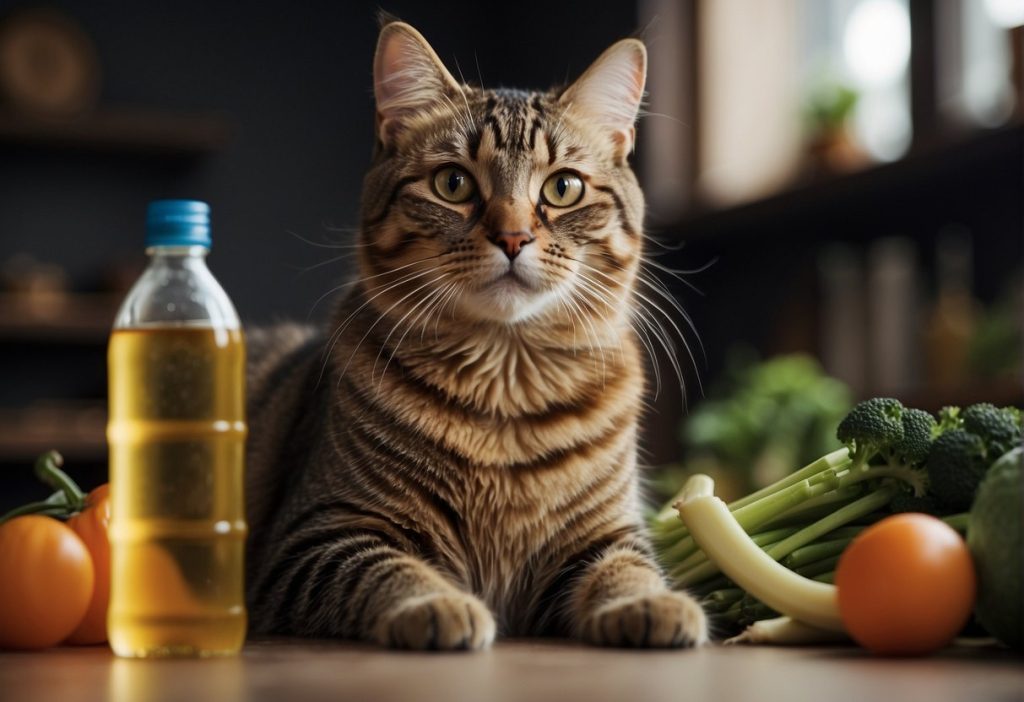
Hey there! Let’s get a quick snapshot of what we’ve discussed about cats and vegetable oil:
- Safety in Small Doses: A little vegetable oil won’t cause harm, and it’s sometimes found in commercial cat foods.
- Balance is Key: Cats should ideally get their fats from a balanced diet tailored to their needs.
- Animal Fats vs. Vegetable Fats: Cats metabolize animal fats more efficiently than vegetable oils.
Remember, moderation is crucial when it comes to your furry friend’s diet. Here’s what you need to keep in mind:
- Small Quantities: If you’re using vegetable oil, only a tiny amount should be considered.
- Know the Risks: Overconsumption can lead to health issues, so it’s best to avoid regular use.
And don’t forget:
- Consult Your Vet: Before adding or changing anything in your cat’s diet, talk to a professional.
- Ongoing Education: Always stay informed about the best dietary practices for your cat’s health.
Have concerns or questions? Your vet is just a call away. Stay curious and informed to keep your kitty purring health!
Frequently Asked Questions
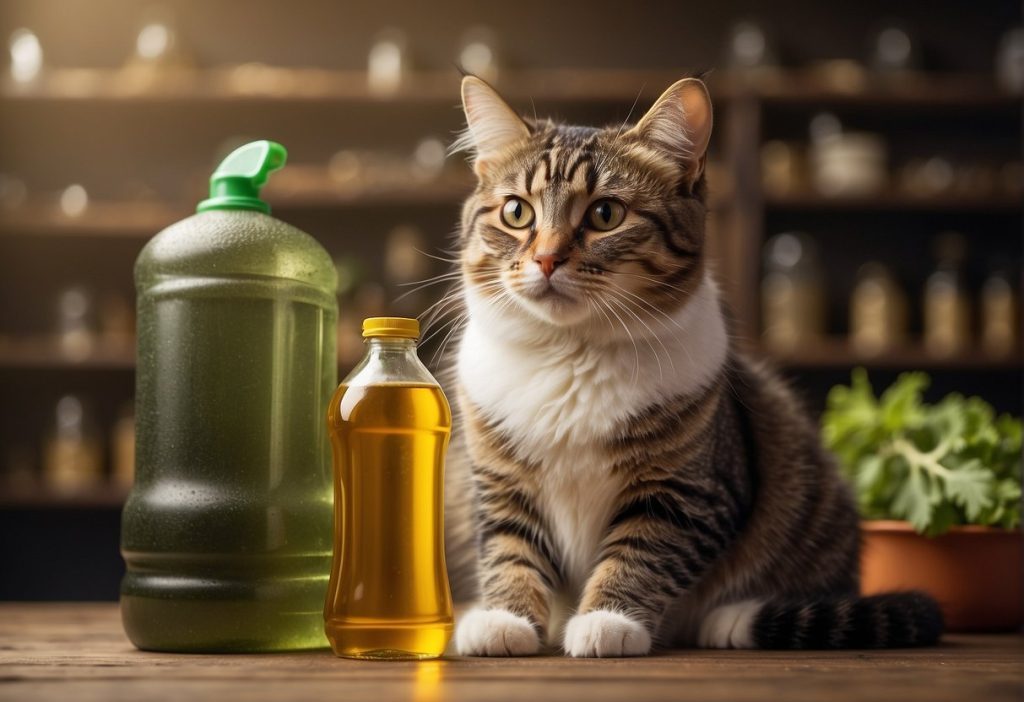
Navigating the world of feline nutrition can be a bit tricky, especially when it comes to what’s safe for them to ingest outside their usual diet.
Let’s tackle some common queries you might have about cats and vegetable oil.
My kitty sneaked a lick of vegetable oil – should I be worried about that?
A small amount of vegetable oil ingested by your cat should not be a cause for concern.
Cats are known to be curious creatures, and a little taste of vegetable oil is unlikely to harm them.
Just keep an eye on your furry friend and make sure it doesn’t become a habit.
Sunflower and canola oils: are they on the ‘yes-please’ list for cats or a no-go?
Sunflower and canola oils are not toxic to cats, but that doesn’t mean they should be a regular addition to their meals.
Moderation is key, as these oils are high in fat and calories which can lead to weight gain if offered frequently.
In the great debate of adding oils to cat food, what’s the verdict for my fur baby’s health?
While some oils can be beneficial in small amounts, typically, cats do not need added vegetable oils in their diet.
These oils can provide a source of energy and fatty acids, but your cat’s regular food should already be nutritionally complete.
Can vegetable oil help with my cat’s constipation?
Vegetable oil has been known to aid in alleviating constipation in cats as it can act as a mild laxative. However, it should not be a substitute for proper veterinary care.
If your cat is frequently constipated, consult your vet for the best course of action.
Is vegetable oil safe for kittens?
Kittens have delicate digestive systems, and it’s generally advised to avoid giving them vegetable oil.
Their diets should be strictly controlled to ensure they get the proper nutrients for healthy growth.
Are there any signs of vegetable oil allergies in cats?
Yes, just like humans, cats can have food allergies.
If you notice signs of an allergic reaction such as itching, swelling, or gastrointestinal upset after your cat consumes vegetable oil, it’s time to stop and consult your veterinarian.
What’s the best way to introduce vegetable oil into my cat’s diet?
If you decide to introduce vegetable oil to your cat’s diet, start with a small amount. You can mix a few drops into their regular food.
Always monitor your cat’s reaction and consult with your vet before making any dietary changes.

